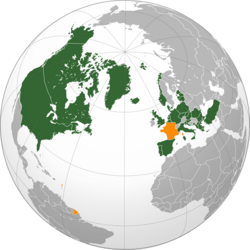
The North Atlantic Treaty Organization, also called the North Atlantic Alliance, is an intergovernmental military alliance of 32 member states—30 European and 2 North American. Established in the aftermath of World War II, the organization implements the North Atlantic Treaty, signed in Washington, D.C., on 4 April 1949. NATO is a collective security system: its independent member states agree to defend each other against attacks by third parties. During the Cold War, NATO operated as a check on the threat posed by the Soviet Union. The alliance remained in place after the dissolution of the Soviet Union and the Warsaw Pact, and has been involved in military operations in the Balkans, the Middle East, South Asia, and Africa. The organization's motto is animus in consulendo liber. The organization's strategic concepts include deterrence.

The Warsaw Pact (WP), formally the Treaty of Friendship, Cooperation and Mutual Assistance (TFCMA), was a collective defense treaty signed in Warsaw, Poland, between the Soviet Union and seven other Eastern Bloc socialist republics of Central and Eastern Europe in May 1955, during the Cold War. The term "Warsaw Pact" commonly refers to both the treaty itself and its resultant military alliance, the Warsaw Treaty Organization (WTO). The Warsaw Pact was the military complement to the Council for Mutual Economic Assistance (Comecon), the economic organization for the Eastern Bloc states.

Gaullism is a French political stance based on the thought and action of World War II French Resistance leader Charles de Gaulle, who would become the founding President of the Fifth French Republic. De Gaulle withdrew French forces from the NATO Command Structure, forced the removal of Allied bases from France, as well as initiated France's own independent nuclear deterrent programme. His actions were predicated on the view that France would not be subordinate to other nations.
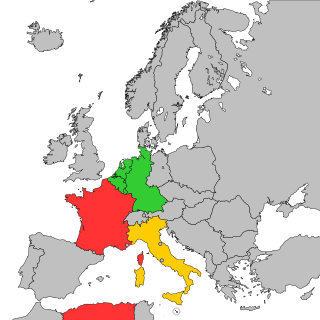
The Treaty establishing the European Defence Community, also known as the Treaty of Paris, is an unratified treaty signed on 27 May 1952 by the six 'inner' countries of European integration: Belgium, Luxemburg, the Netherlands, France, Italy, and West Germany. The treaty would have created a European Defence Community (EDC), with a unified defence force acting as an autonomous European pillar within the North Atlantic Treaty Organization (NATO). The ratification process was completed in the Benelux countries and West Germany, but stranded after the treaty was rejected in the French National Assembly. Instead, the London and Paris Conferences provided for West Germany's accession to NATO and the Western European Union (WEU), the latter of which was a transformed version of the pre-existing Western Union. The historian Odd Arne Westad calls the plan "far too complex to work in practice".

The Mutual Defense Assistance Act was a United States Act of Congress signed by President Harry S. Truman on 6 October 1949. For U.S. foreign policy, it was the first U.S. military foreign aid legislation of the Cold War era, and initially to Europe. The Act followed Truman's signing of the Economic Cooperation Act, on April 3, 1948, which provided non-military, economic reconstruction and development aid to Europe.
The original Treaty on Conventional Armed Forces in Europe (CFE) was negotiated and concluded during the last years of the Cold War and established comprehensive limits on key categories of conventional military equipment in Europe and mandated the destruction of excess weaponry. The treaty proposed equal limits for the two "groups of states-parties", the North Atlantic Treaty Organization (NATO) and the Warsaw Pact. In 2007, Russia "suspended" its participation in the treaty, and on 10 March 2015, citing NATO's alleged de facto breach of the Treaty, Russia formally announced it was "completely" halting its participation in it as of the next day. On 7 November 2023, Russia withdrew from the treaty, and in response the United States and its NATO allies suspended their participation in the treaty.

André Beaufre was a French Army officer and military strategist who attained the rank of Général d'Armée before his retirement in 1961.
Frédéric Bozo is a professor at the University of Paris III: Sorbonne Nouvelle, where he teaches contemporary history and international relations. He is also a Senior Research Associate at the Institut français des relations internationales (IFRI) where his focus is on Atlantic and European security issues.
The foreign policy of the François Mitterrand administration was the foreign policy of France under François Mitterrand that emphasized European unity and the preservation of France's special relationships with its former colonies in the face of "Anglo-Saxon influence." He served as President of France for two 7-year terms, from 1981 to 1995. A part of the enacted policies was formulated in the Socialist Party's 110 Propositions for France, the electoral program for the 1981 presidential election. He had a warm and effective relationship with the conservative German Chancellor Helmut Kohl. They promoted French-German bilateralism in Europe and strengthened military cooperation between the two countries. There was a high Level of continuity with the policies of Charles de Gaulle especially in terms of nationalism, NATO, nuclear weapons, French Africa, and distrust of the British and Americans.

France emerged from World War II in the 1960s, rebuilding the country physically and the nation's national identity through the French Fifth Republic. Under the leadership of President Charles de Gaulle (1959–1969), France regained its great power status.

NATO is an international military alliance consisting of 32 member states from Europe and North America. It was established at the signing of the North Atlantic Treaty on 4 April 1949. Article 5 of the treaty states that if an armed attack occurs against one of the member states, it shall be considered an attack against all members, and other members shall assist the attacked member, with armed forces if necessary. Article 6 of the treaty limits the scope of Article 5 to the islands north of the Tropic of Cancer, the North American and European mainlands, the entirety of Turkey, and French Algeria, the last of which has been moot since July 1962. Thus, an attack on Hawaii, Puerto Rico, French Guiana, the Falkland Islands, Ceuta or Melilla, among other places, would not trigger an Article 5 response.
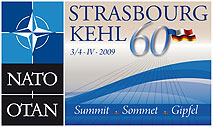
The 2009 Strasbourg–Kehl Summit was the 22nd NATO summit of heads of state and heads of government held in Strasbourg, France, and in Kehl and Baden-Baden, Germany, on 3–4 April 2009. The summit marked the 60th anniversary of the establishment of North Atlantic Treaty Organization (NATO). Primarily a celebratory 60th-anniversary event, the agenda included a number of urgent topics commanding the NATO leaders' attention.

The NATO headquarters is the political and administrative center of the North Atlantic Treaty Organization (NATO). After previous locations in London and Paris, it has been headquartered in Brussels since 1967, in a complex in Haren, part of the City of Brussels, along the Boulevard Léopold III/Leopold III-laan.
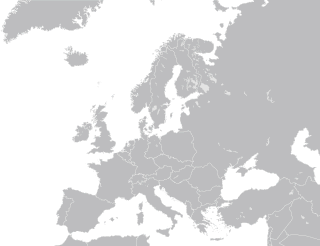
The history of the North Atlantic Treaty Organization (NATO) begins in the immediate aftermath of World War II when British diplomacy set the stage to contain the Soviet Union and to stop the expansion of Soviet power in Europe. The United Kingdom and France signed, in 1947, the Treaty of Dunkirk, a defensive pact, which was expanded in 1948 with the Treaty of Brussels to add the three Benelux countries and committed them to collective defense against an armed attack for fifty years. The British worked with Washington to expand the alliance into NATO in 1949, adding the United States and Canada as well as Italy, Portugal, Norway, Denmark, and Iceland. Greece and Turkey joined in 1952, West Germany joined in 1955, Spain joined in 1982, Czech Republic, Hungary and Poland joined in 1999, Bulgaria, Estonia, Latvia, Lithuania, Romania, Slovakia, and Slovenia joined in 2004, Albania and Croatia joined in 2009, Montenegro joined in 2017, North Macedonia joined in 2020, Finland joined in 2023, and Sweden joined in 2024.
The foreign policy of Charles de Gaulle covers the diplomacy of Charles de Gaulle as French leader 1940–1946 and 1959–1969, along with his followers and successors.
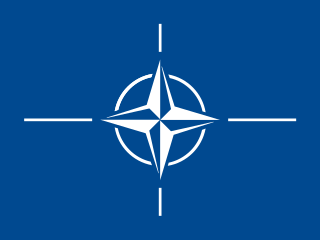
Withdrawal from the North Atlantic Treaty Organization (NATO) is the legal and political process whereby a member of the North Atlantic Treaty Organisation withdraws from the North Atlantic Treaty, and thus the country in question ceases to be a member of NATO. The formal process is stated in article 13 of the Treaty. This says that any country that wants to leave must send the United States a "notice of denunciation", which the U.S. would then pass on to the other Allies. After a one-year waiting period, the country that wants to leave would be out.
French-Soviet Joint Declaration of June 30, 1966 is an important agreement on a range of cooperation between the Soviet Union and France, signed in Moscow at the same date by President of the Presidium of the Supreme Soviet of the USSR Nikolai Podgorny and President of the French Republic Charles de Gaulle, which resumed with the Russian Federation since then.

The Nuclear Planning Group was established in December 1966 to allow better communication, consultation and involvement among NATO member nations to deal with matters related to nuclear policy issues. During the period of the Cold War, NATO members recognized the need for incorporation of nuclear weapons as part of their defense strategy. Because of the lack of information sharing caused by restrictive US nuclear information sharing policy, many attempts were made to increase US–NATO communication and information sharing in relation to nuclear weapons such as the amendment of the Atomic Energy Act, the US–NATO Information Agreement, and the proposal of the Multilateral Force (MLF). Eventually, the Nuclear Planning Group was established as a finalized effort to deal with nuclear information sharing issues. There are three main levels to the Nuclear Planning Group. These are the ministerial level of the Nuclear Planning Group, the Permanent Representatives Group, and the Staff Group. In addition, the High-Level Group is a closely related organization that works in an advisory manner with the Nuclear Planning Group. Deliberations upon agenda topics will begin from the Staff Group level and eventually ascend to the ministerial level. The Nuclear Planning Group consists of all NATO members with the exception of France. Overall, the Nuclear Planning Group has created policy guidelines for nuclear-related topics while seeking to minimize the threat of nuclear conflict.
Foreign relations between France and the Soviet Union officially began on 28 October, 1924.

The history of France's military nuclear program recounts the path that led France to develop a military nuclear program after World War II. The establishment of the French Nuclear Deterrence Force was based on a French nuclear testing program that began on February 13, 1960, and ended on January 27, 1996.
